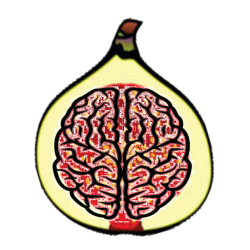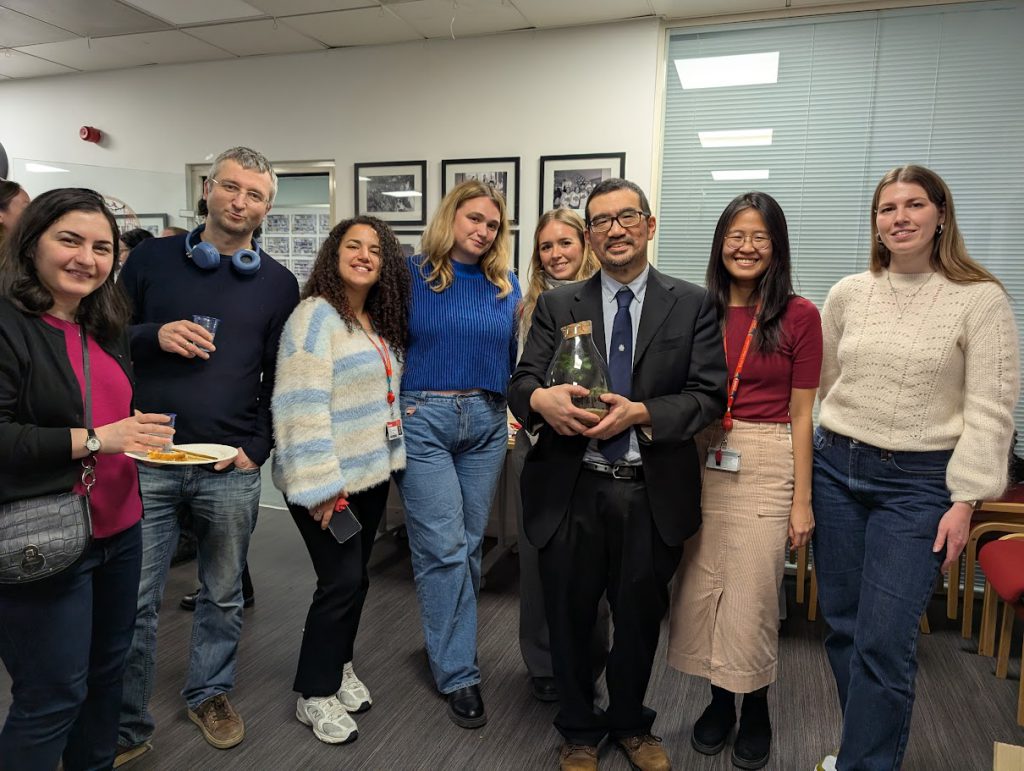
We are an interdisciplinary team of clinicians, neuroscientists, physicists, and bioengineers.
If you are interested in joining us, we have PhD student opportunities available on the: King’s College London MRC doctoral training partnership in biomedical sciences (KCL MRC DTP), EPSRC CDT in Smart Medical Imaging, the MRC-ITND PhD fellowship scheme through the MRC Centre for Neurodevelopmental Disorders, and the London Interdisciplinary Doctoral Programme (LIDo).
Professor Tomoki Arichi (Group head)
https://kclpure.kcl.ac.uk/portal/tomoki.arichi.html
https://orcid.org/0000-0002-3550-1644

Tom is a MRC Senior Clinical Fellow, Professor of Perinatal Neurocience, and the Head of the Department of Early Life Imaging, in the School of Biomedical Engineering and Imaging Sciences at King’s College London. He is also group lead in the MRC Centre for Neurodevelopmental Disorders (CNDD). His current work aims to apply non-invasive imaging techniques (EEG, functional MRI and simultaneous EEG-fMRI) to characterise the development of functional activity in the human brain, during fetal and preterm life and following brain injury. He is also aiming to gain a deeper understanding of the underlying biophysics of the fMRI signal in the newborn brain. He also holds a visiting position in the Human Robotics group at Imperial College London, where they are developing novel tools for use in the MRI scanner and automated rehabilitative strategies for young infants who have suffered brain injury.
Tom also holds an honorary position as a Consultant in Paediatric Neurodisability in the Evelina London Children’s Hospital. His clinical work is focused on the early identification and resulting management of the disabilities associated with perinatal brain injury.
Tom’s publications on Google Scholar
Tom has co-edited a textbook on Connectome analysis: Characterization, Methods, and Analysis aimed for students and early-career researchers to provide an entry point into brain connectomics and neuroimaging.
Tom is a member of the core team and a co-investigator in the EPSRC funded Neurotechnology Network: Respect 4 Neurodevelopment and is the lead for the Scalability working group
Tom is a board member of the Fetal Infant Toddler Neuroimaging Group (FIT’NG) and was the Program committee co-chair for the FIT’NG meeting held in Santa Rosa CA September 10th-11th; and the co-chair for the 2024 meeting to be held in Baltimore MA on September 25-26th.

Dr Slava Karolis (Postdoctoral Research Associate)

Slava completed his PhD in the Institute of Cognitive Neuroscience (University College London) where he studied the topic of number representations in the human brain. His first postdoc was in the Institute of Psychiatry (King’s College London) where, as a member of the Neurodevelopment and Mental Health Group, he was working on the characterisation of anatomical and behavioural consequences of very preterm birth from adolescence into adulthood. He then spent several months in France (Institut du Cerveau et de la Moelle épinière, Hôpital de la Salpêtrière, Sorbonne) working on the atlas of brain regions that show functional hemispheric specialisation and characterising their structural connectivity. In 2018 Slava joined the developing Human Connectome Project as a member of the Analysis Group in FMRIB, Oxford, where he undertook studying signal properties of the in-utero functional MRI and developing an analytical pipeline for these data. He now continues this work as a PFIGist in the Centre for Developing Brain. His main research interest is fetal brain fMRI.
Slava’s recent work describing a novel methodology for characterising maturational networks of emerging brain activity with fetal fMRI has been presented at several international conferences and can be found here:
Karolis et al. Maturational networks of fetal brain activity. Communications Biology 2023: https://doi.org/10.1101/2022.06.14.495883
Karolis et al. The developing Human Connectome Project fetal functional MRI release: Methods and data structures. Imaging Neuroscience 2025: https://www.biorxiv.org/content/10.1101/2024.06.13.598863v2.full
Dr Parvaneh Adibpour (Marie-Curie Postdoctoral Fellow)
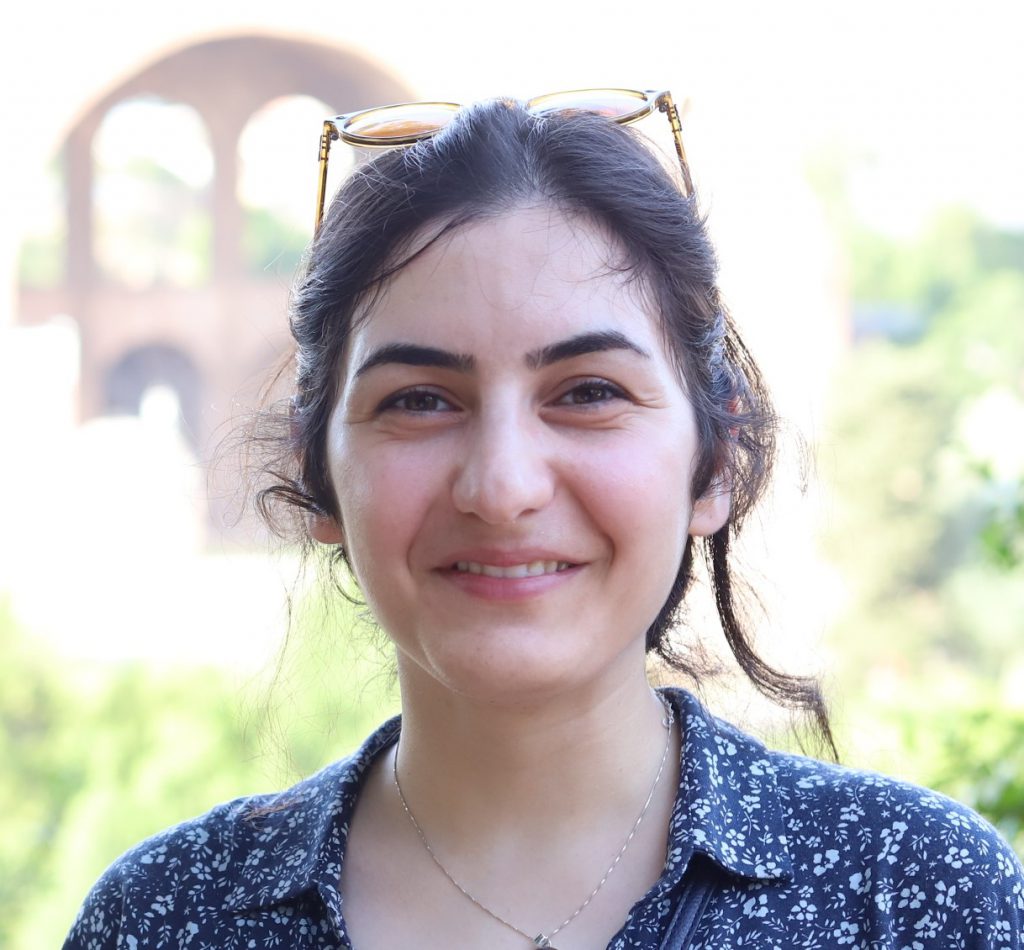
Parvaneh is a postdoctoral fellow in the Department of Early Life Imaging (King’s College London) since March 2023, working with Tomoki Arichi and Jonathan O’Muircheartaigh. Her current work aims at combining EEG and functional/MRI in order to gain a better understanding of sensori-motor development in neonates at low and high risk of atypical developmental outcomes. Before joining the team, Parvaneh pursued her PhD (2017) and postdoctoral training (2018-2023) in France, where she studied early sensory and cognitive development in infancy using EEG, diffusion MRI, as well as eye tracking.
Dr Jucha Willers Moore (Postdoctoral Researcher in ultra-high field fMRI)

Jucha is an MRC PhD student at the Centre for Neurodevelopmental Disorders, co-supervised with Dr. Laura Andreae and Dr. Katie Long. She obtained a MSci Neuroscience at University College London in 2020, where she worked with Dr. Lorenzo Fabrizi investigating the development of neurovascular coupling in neonates and the development of nociceptive brain states in the preterm infant using EEG. During her undergraduate studies, Jucha was awarded a Wellcome Trust Biomedical Vacation Scholarship in 2019 to investigate the regulation of neurotrophic factor uptake at the neuromuscular junction at the UCL Institute of Neurology wit Prof. Giampietro Schiavo.
Jucha joined the Department of Early Life Imaging at King’s College London in 2021 where she began her PhD working on fetal functional MRI, characterising the development of spontaneous neural activity in utero. Jucha is also working with Dr. Laura Andreae at Centre for Neurodevelopmental Disorders where she is looking at the development of spontaneous activity patterns in the human fetal cortex in vitro using calcium imaging. By combining these two techniques, Jucha’s PhD aimed to understand how spontaneous neural activity changes from within local circuitry to across large-scale networks in the fetus throughout the second and third trimesters of gestation.
In the second stage of her PhD, Jucha became a laminaut and is currently leading the work exploring cortical depth specific activity in neonates using 7 Tesla fMRI in collaboration with Professor Jon Polimeni at Stanford.
Jucha’s publications:
Willers Moore et al. Gradient organisation of functional connectivity within resting state networks is present from 25 weeks gestation in the human fetal brain. eLife (under peer review)
Juliette Champaud (LIDo PhD student)
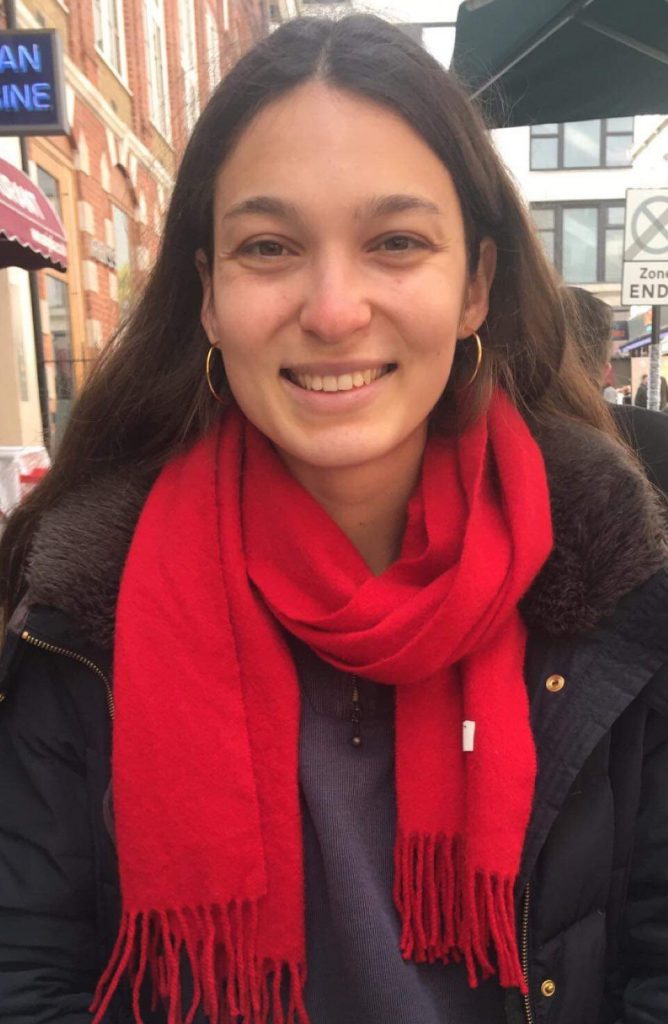
Juliette is a BBSRC-funded LIDo PhD student at the UCL Neuroscience department, co-supervised with Dr. Lorenzo Fabrizi. She obtained a MSci Natural Sciences in Medical Physics and Neuroscience and Psychology at UCL in 2021. She worked with Dr. Peter Wijeratne from the Centre for Medical Image Computing investigating the order of structural brain changes that occur as a result of Huntington’s disease using MRI data and machine learning tools. During her undergraduate studies, Juliette worked as a research assistant in Prof. Michael Hausser’s Neural Computation Lab where she investigated the role of primary somatosensory cortex neurons in decision coding.
Juliette joined the Department of Early Life Imaging in 2022, following an initial 4-month LIDo rotation, where she began her PhD working on neonatal development of brain metastability, using simultaneous EEG-fMRI. Juliette’s PhD work will aim to better understand how the spontaneous neural activity at rest, crucial for the healthy maturation of the brain, changes during the last trimester of gestation. She will specifically focus on EEG microstates and their anatomical substrate thanks to fMRI recorded simultaneously, combining expertise and data from both UCL and KCL
Alice Thomson (MRC CNDD PhD student)
Alice is an MRC PhD student at the Centre for Neurodevelopmental Disorders, co-supervised with Dr. Nick Puts. Alice’s PhD focuses on using edited MRS methods to characterise the atypical neurochemical development that underpins autism spectrum conditions, associating the chemical findings to behavioural/cognitive phenotypes and genetic variation.
Alice’s publications:
Thomson et al. The developmental trajectory of 1H-MRS brain metabolites from childhood to adulthood. Cerebral Cortex 2024; 34(3).
Thomson et al. Neurometabolite differences in Autism as assessed with Magnetic Resonance Spectroscopy: A systematic review and meta-analysis. Neuoscience and Biobehavioral Reviews 2024; 162: 105728.
Laura Bravo Balsa (MRC DTP PhD student)
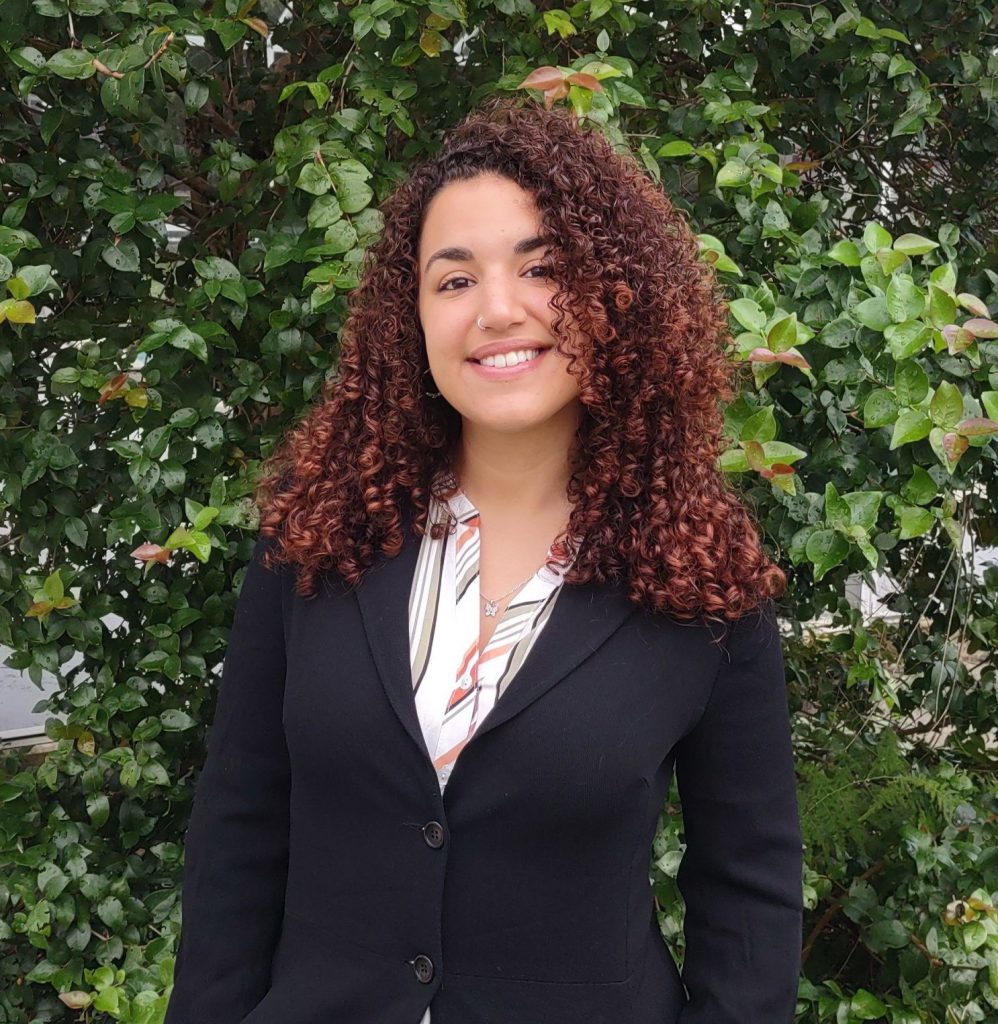
Laura is an MRC PhD student at the Department of Early Life Imaging (King’s College London) since October 2023, co-supervised with Professor Jo Hajnal and Professor Eva Loth. She obtained a BSc in Psychology at the Universidad Autónoma de Madrid (Spain) in 2019, where she was awarded an International Cooperation scholarship to do a six-month internship in a day centre for children with multiple learning disabilities in Havana (Cuba). Since then, neurodiversity has been at the centre of her work across research, clinical, and educational settings. She obtained an MSc in Brain Imaging and Cognitive Neuroscience from the University of Birmingham, where she focused on dynamic functional connectivity analysis of fMRI data in autistic adults. In 2022, she joined Professor Eva Loth’s lab as a research assistant in the Longitudinal European Autism Project (LEAP), a multi-disciplinary study investigating biological markers in autism.
During her PhD, Laura will be exploring cognitive development in early infancy by using a novel MR-compatible virtual reality system for MRI data acquisition in toddlers. Her work will aim to better understand brain mechanisms underlying cognitive processing and their association with neurodiverse trait expression in early childhood.
Xin Yi Ng (Wellcome Trust PhD student)

Xin Yi is a Neuro-Immune Interactions in Health & Disease Wellcome Trust PhD Programme student, co-supervised by Professor Carsten Flohr. She obtained a BSc in Biological Sciences with Honours from Nanyang Technological University, Singapore in 2019. Following the completion of her studies, she started working as a research assistant in Dr Cao Mian’s lab at Duke-NUS Medical School, where she investigated how the loss of function of endocytic proteins, Synaptojanin 1 and/or Auxilin, in mice models lead to early-onset Parkinsonism.
In 2023, Xin Yi moved to the UK to start her postgraduate studies at King’s College London. Xin Yi’s PhD will focus on understanding the neurocutaneous axis in atopic dermatitis. She will use different techniques (skin immune profiling, sleep study, cognitive tasks and MRI) to unveil the complex interplay between atopic dermatitis, inflammation, sleep disturbances and neuropsychiatric disorders.
Antonia Massmann (MRC CNDD PhD student)

Antonia is an MRC PhD student at the Centre for Neurodevelopmental Disorders, co-supervised with Dr. Nick Puts and Dr. Anthony Vernon. Her PhD aims to understand the emergence of neural processing for discriminating tactile stimulation in early human infancy. She will study this using 7 Tesla fMRI to characterise patterns of brain activity elicited by different forms of touch (mechanical versus social) and conditions (social versus osteopathic therapeutic).
Lixuan Zhu (Research Assistant & PhD student 2024-2027)

Lixuan is a PhD student in the Department of Early Life Imaging, King’s College London since October 2024, co-supervised with Dr Dafnis Batalle and Professor Jo Hajnal. She obtained her Master of Engineering degree in Biomedical Engineering in King’s College London in 2022 and worked with the team to investigate the social attention using the MRI compatible VR system. Then she joined ShanghaiTech University in China as a MR engineer and help with the construction of the Chinese Baby Connectome Project (CBCP).
Lixuan came back to King’s for her PhD research in 2024 and her aim is to use the MR compatible VR system to explore differences in brain processing in neurodevelopmental conditions, with a particular focus on Autism.
Almunus: Dr Ryan Stanyard (MRC DTP PhD student 2020-2024)
Ryan was an MRC PhD student at the Department of Early Life Imaging and Department of Forensic and Neurodevelopmental Sciences, King’s College London, co-supervised with Dr Dafnis Batalle and Professor Grainne McAlonan. His PhD focused on exploring EEG measures of E:I balance including understanding maturation of the aperiodic exponent in infancy to young adulthood; and the relationship between EEG frequency bands and resting state networks in preterm infants using simultaneous EEG-fMRI data. Ryan is currently a research associate at Keele University.
Ryan’s PFIG publications:
Stanyard et al. Aperiodic and Hurst exponents across early human development: A systematic review. Developmental Cognitive Neuroscience 2024; 68: 101402.
Alumnus: Dr Sian Wilson (MRC CNDD PhD student 2019-2023)
Siân was an MRC-Sackler PhD student at the Centre for Neurodevelopmental Disorders, Kings College London co-supervised with Dr Jonathan O’Muircheartaigh and Professor David Edwards. Her PhD focused on the development and application of fetal diffusion MRI, characterising the in-utero development of white matter tracts. Siân is currently a postdoctoral research associate in Dr Kiho Im’s group at Harvard University.
Sian’s PFIG publications:
Wilson et al. Dynamic changes in subplate and cortical plate microstructure at the onset of cortical folding in vivo. ELife 2024.
Wilson et al. Spatiotemporal tissue maturation of thalamocortical pathways in the human fetal brain. ELife 2023; 12: e83727.
Wilson et al. Development of human white matter pathways in utero over the second and third trimester. PNAS 2021; 118 (20) e2023598118.
Alumnus: Dr Sara Neumane (Bettencourt Foundation fellow)
Sara has a double background and is qualified in France as an MD in Paediatrics (focusing on Neuropaediatrics and rehabilitation) but also has a PhD in Neuroscience (focusing on functional somatotopy, motor system and compensatory mechanisms in a pathological context). Her research focused structural & functional brain connectivity in typical and atypical development, sensorimotor system development and functional outcomes following early acquired brain injuries.
Alumnus: Dr Maria Yanez Lopez (Postdoctoral Research Associate 2019-2021)
Maria’s work focused on studying the balance between excitatory (glutamate) and inhibitory GABA neurotransmitter levels in newborn infants who have a high familial risk of developing neurodevelopmental disorders, using edited 1H MRS methods.
Maria is now the MR Physics lead at Swansea University Hospital NHS Trust.
Maria’s PFIG Publications:
Yanez Lopez et al. Simultaneous quantification of GABA, Glx and GSH in the neonatal human brain using magnetic resonance spectroscopy. Neuroimage 2021
Song et al. Edited Magnetic Resonance Spectroscopy in the neonatal brain. Neuroradiology 2021
Alumnus: Dr Tanya Poppe (Postdoctoral Research Associate 2018-2021)
Tanya’s work focused on using simultaneous EEG-fMRI in neonates to study the development of functional activity in the human brain. This work was recognised with a Summa cum Laude award as one of the top 5% of abstracts the ISMRM annual meeting 2019. Tanya is now working for Ixico as a biomarker scientist.
Tanya’s PFIG publications:
T Poppe et al. Individual focused studies of functional brain development in early human infancy. Current Opinions in Behavioural Sciences 2021; 40: 137-43.
Alumnus: Anna Lukens (Neonatal physiotherapist 2019-2021)
Anna worked with the team as a highly specialist neonatal physiotherapist on the neonatal unit at the Evelina London Children’s Hospital. From 2019-2021 she worked specifically on the EPSRC funded MAVEHA project to explore methods for quantification of spontaneous motor behaviour in neonates.
Anna is now the neonatal physiotherapy lead in the South Thames neonatal network and at the Evelina London Neonatal Intensive Care Unit.
Anna’s publications:
Predictive validity of the Lacey Assessment of Preterm infants for motor outcome at 2 years corrected age. AM Lukens, NR Winfield, CA Xanthidis, T Arichi. Early Human Development (in press)
Alumnus: Dr Sofia Dall’Orso (PhD student 2016-2019)
Sofia completed her PhD at Imperial College London in 2019. During her PhD, she combined engineering and imaging techniques with robotic tools to perform task-based fMRI on newborn babies. Her research focused in particular on the sensory system, comprising investigating somatotopic mapping in the preterm brain and the study of associate learning between different sensory modalities.
Sofia is now working for i3tex on product research and development.
Sofia’s PFIG publications:
Dall’Orso et al. Somatotopic mapping of the developing sensorimotor cortex in the preterm human brain. Cerebral Cortex 2018; 28(7): 2507-15.
Dall’Orso et al. Cortical Processing of multimodal sensory learning in human neonates. Cerebral Cortex 2021; 31(3): 1827-36.
Dall’Orso et al. Development of functional organization within the sensorimotor network across the perinatal period. Human Brain Mapping 2022.
Alumnus: Dr Judit Ciarrusta (PhD student 2015-2019)
Judit gained her PhD with us at King’s College London in 2019 as part of Brainview, a Marie Curie Early Career Initiative investigating early autism risk markers. The focus of her PhD was on typical and atypical functional activity development using fMRI data from subjects with family history of autism (high risk) and without family history of psychiatric (low risk) to discern typical from atypical maturation mechanisms.
Judit is now has a research fellowship from the Spanish Government to continue her exciting work into early brain development at Pompeu Fabra University, Barcelona.
Judit’s PFIG publications:
Ciarrusta et al. Social brain functional maturation in newborn infants with and without family history of autism spectrum disorder.
JAMA Netw Open. 2019;2(4):e191868.
Ciarrusta et al. Emerging functional connectivity differences in newborn infants vulnerable to autism spectrum disorders.Translational Psychiatry 2020; 10: Article number: 131.
Collaborators:
Our work would not be possible without working closely with colleagues across different fields and in different institutions:
- Dr Lorenzo Fabrizi (Neuroscience, Physiology & Pharmacology, UCL)
- Professor Etienne Burdet (Human Robotics Group, Imperial College London)
- Dr Bernhard Kainz (Computer Science, Imperial College London)
- Professor Grainne McAlonan (IOPPN, King’s College London)
- Professor Bill Fifer (Medical Psychology, Columbia University)
- Dr Jonathan O’Muicheartaigh (King’s College London)
- Dr Dafnis Batalle (King’s College London)
- Dr Jessica Dubois (INSERM, Paris)
- Dr Jonathan Polimeni (Stanford)

